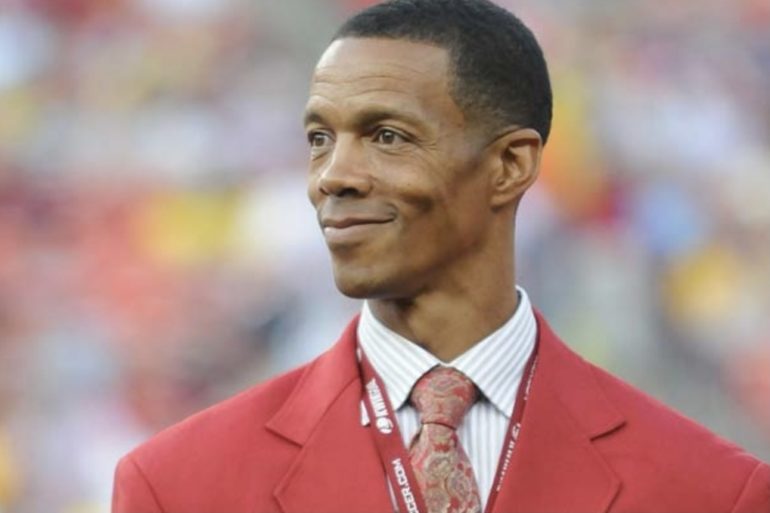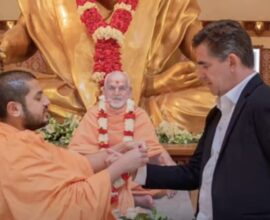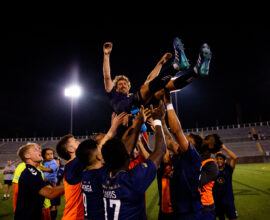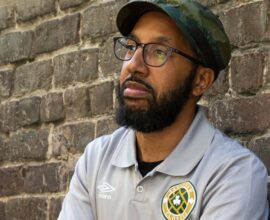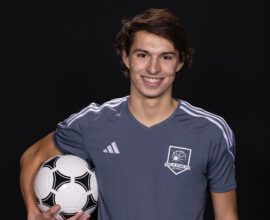We Are NISA Nation: An Interview with Pioneer Premier League Commissioner Desmond Armstrong
By Alexa Doebler
Last week, the National Independent Soccer Association (NISA) proudly announced an amateur league affiliation with the new Tennessee-based Pioneer Premier League (PPL). The Pioneer Premier League is owned and led by Desmond Armstrong and his business partner. Desmond himself is a pioneer in the American game as the first Black player born in the United States to start for the USA at a FIFA World Cup (Italia ’90), among many other accolades and accomplishments. I had the opportunity to speak with Desmond about all things soccer, the PPL, and the future of soccer in this country. As we always do, we started simply with Desmond’s own journey into soccer.
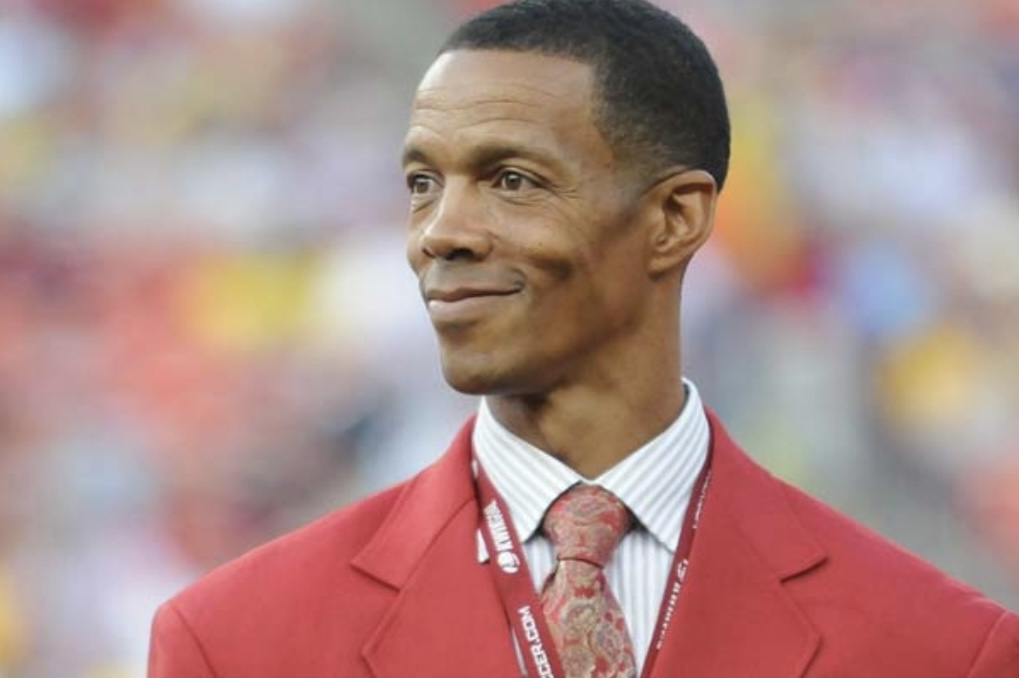
“My story is, I was born in Washington DC, grew up in the city up until about my teen years. This is in the mid-70s. We then moved from an all-black community to an all-white community. We were actually the first African-American family, first black family, to move into this neighborhood in the suburbs of Maryland. Once we moved into that community, I encountered soccer because in the city, we didn’t know anything about soccer, never heard about it, never seen it. We were encountering the basic American sports there, you know, American Football, Basketball and so forth. I actually played Tennis as well. My father was a Recreational Therapist for the city of DC and so he was introducing different sports to the kids in the summer and so I learned tennis through that early.”
Desmond explains that he played soccer for a bit before really falling in love with the game and understanding the sport truly.
“It took me about 2 years really to sort of understand what we were doing. I mean, I was a good athlete, so I was running around the field and chasing a ball and everything, but I didn’t really know what was going on until we took a trip to England. My local club team decided to do fundraisers for a 2 week trip to England. First time I was ever on a plane, travelling across the pond, landing in the country that the origins of soccer began. We were in a small town in the area of Cambridge, a small town called Sutton. We had host families and we lived with the families for 2 weeks. Funny story is, back then in the 70s and 80s, in England, being a black kid playing soccer from America…it was a whole other world. So we came from the airport on a bus and as each of the guys got off the bus, they’d call his name and the families that were hosting were listening for the name. So, you know, they’d say, ‘Rosenswag’..or whatever…boom, they get him. Then, ‘Burnis’, they get him. And then I’m coming out with an Anglo-Saxon name… ‘Armstrong’…and everyone’s excited and then I get off the bus, and everyone’s quiet as a mouse, like ‘Who gets that guy?!’” Desmond laughs recalling this moment.
“So I went with a family and they had 3 kids, and all of their kids were named with D’s, Dale, Darren, Donna. And then I came out Desmond. So they went from the 3 D’s to the 4 D’s in the family. And it turned out to just be such a great experience.”
And the best part of that experience was what Desmond learned about the game…something that stuck with him through all of his soccer experiences.
“And for me, by way of soccer, that international experience really opened my eyes to what soccer truly is in its most natural form culturally. And so that always stayed with me and that carried me through my career. As a player for one, I wanted to see the world and I thought I had a little bit of talent ultimately. And I was really blessed to be able to go as far as I did and have the experiences I did through soccer.”
“And now, on the other side of it, fully retired, I look and think, this is what really got me involved in organizing my own team, even at a lower level. I wanted to create something that was connected to the community, what I experienced way back when. I mean the town of Sutton is small, I mean it’s in the country. Back then they had the milkman bringing the glass milk jars to the door. I mean, they were small but they were connected and community driven. And I wanted to try and create something along the same lines but a different cultural experience.”
“The closest I could get to was a 4th division team in the city of Nashville, connected through the existing cultural infrastructure for sports in the United States. And that’s really through the mindset of almost like a local high school mentality. So, this school team represents this neck of the neighborhood and we’re going to go across town and play against the other school team that exists and they’re our rivals. And that’s really the epitome of what soccer is globally, of which culturally, as Americans, we don’t necessarily appreciate in soccer. But culturally, we do in other sports. Good example: I lived in Alabama for 2 years and we lived where the big rivalry was Alabama vs. Auburn. So Alabama has life-long supporters, meaning, my family has had season tickets for Alabama since my great grandpappy was alive, that sort of thing. That actually exists in Liverpool, soccer-wise. So that’s the equivalent, culture-wise, here in the US.”
Desmond could see places in the US where sports worked this way, yet it was not happening in soccer. He decided to try and create a new culture in US Soccer.
“So, taking that back to where I am, at the local level, the infrastructure that’s already here is that whole context of, ‘I support my local high school team, the local high school superstar, I follow him ever since he was playing Pee-wee basketball…so I support this team because this team represents my community.’ And that’s what I wanted to create here with AFC615. So we are a year into it and we have community club members. All of our members of the Pioneer Premier League have a youth club underneath them. And the youth club is the feeder for the support group for the top team. And, again, while we don’t have that by way of soccer here, we do have that culturally with other sports. So I’m just trying to transfer what already exists here, over to the wave and growth of soccer in this country.”
So naturally, conversation shifted to the team that began Desmond on the journey to create the PPL.
“AFC615 began just a year ago. The impetus behind that was that I was taking my youngest son, who was, at the time, 16. We lived here in Nashville and I was looking around like, ‘Ok, so what am I going to do with him because he’s a talented player. There is no professional academy here for his age even though we have Nashville Soccer Club’. So I took him up to Louisville City FC’s Academy and he had a trial. So, I drove 2.5 hours to take him to the trial and I watched what they did with him, the other players that were there, and I watched the coaching. And then I drove home 2.5 hrs. And on the way home, I thought, ‘Am I really going to commit to driving this far for him to go up here to be trained by these guys?’ I mean, what they’ve established and are doing is great, but, my point was, is there another way? Is there something I can do for my son, relative to his age and with what exists within my reach for his good?”
Essentially, Desmond was finding himself in the position of many parents, in the gap that exists in soccer in this country, the lack of available paths for the next steps for talented youth in this country. While most parents would just have to drive the long distance, Desmond knew that because of his background, he could do something about it locally instead of just dealing with whatever few options were available.
“So I started looking around. And i’ve coached in the Academies for Columbus Crew, DC United,Sporting Kansas City. I’ve coached at the Dallas Cup, the Disney Cup, the Jefferson Cup. I’ve coached in NPSL…I’ve coached everywhere. I’ve coached in college. I’ve coached internationally. So, I’ve been around on that other side. So what am i gonna do? I can have all that experience as a player, all that experience as a coach and transfer that to my sons, but what I was lacking, and has always lacked across America, not just for my kids, is the environment. So what environment can I place him in so that the environment can help to sharpen him and grow? So that’s what I was thinking as I was driving home. Just that I was going to figure something out. I need a team that at his age, he needs the experience of the power and the speed of the game at the higher levels to prepare him for those next levels, and that means a Men’s Team. But I could not afford to have him play in a traditional Sunday League Men’s Team, because they don’t protect young players there, he could get injured there. So that’s what started my mindset of putting a team together, coming up with a concept for AFC615.”
“Initially with AFC615, I was looking around like where are we going to play. I had looked at NISA maybe a couple years prior and thought about that Division III Tier soccer, but a year ago, with AFC615, I wasn’t at that place yet. So I was looking at the lower levels and the UPSL was really the only option for what was around the area. So I entered the team into UPSL, during COVID, and became a Divisional Manager to help them expand. And I was recruiting other teams in our area, basically in Kentucky, Tennessee & Alabama. So I approached these teams to say, ‘Hey, we have an opportunity to do this, get our feet wet, and compete in Fall of 2020’. So I jumped in, and none of the other teams came with me! So we played in the Fall and there were I think 6 teams. And we won the division. Upon winning the division, I went back to those same guys, about 4 or 5 different teams, and they came in in the Spring. So we were Champions in our Inaugural season and I was just delighted. I just wanted to get it off the ground! And we had a player who played with us in the Fall who now is playing with the Pittsburgh Riverhounds.”
Desmond noticed the opportunity that was presenting itself and he wanted to help build the league.
“So after the Spring, I realized, we grew this territory exponentially from the Fall to that of the Spring and we were basically the hands and the feet on the ground. I recruited the teams, we managed the teams, and managed the league. We did all of these things and I was talking to the management of UPSL saying, ‘Look, I want to assist in terms of growing this, this is something that can be cultivated and we can grow it’. And I told them I wanted to connect a youth component to what they already had and this is how we can do it.”
Desmond could see the importance of connecting to the youth soccer community to build the vision of soccer he had experienced all those years ago in England. Those paths from youth all the way up were lacking and this was his proposal to start building that.
“The idea was this, to have community club members, explicitly the members have their own youth clubs that feed into the first team. And by way of that, they can play against each other on the youth level, in our own academy league system and not have to be dependent upon waiting for US Soccer to create one. We don’t have to wait on anyone or convince anyone else. We have the freedom to do it ourselves. So that’s what started it. So I gave the presentation to UPSL. They listened, but they weren’t moving on it for whatever reason…it’s too large, they’re not mobilized to be able to do it, they agree with it, but don’t have the money for it….whatever the reasons are, they aren’t able to do it in the capacity or the speed at which I could do it. And each of these teams have someone on what we call an Alliance Board. So we can manage it ourselves, we don’t have to go to anyone else and wait for approval.”
“So the vision is the connectivity of the Pioneer Academy League to that of the Pioneer Premier League, that our league would be the model for what could happen in the other regions of the country if they so choose to follow our template. So that’s what we’re hoping for. And the connectivity to NISA is vital because NISA Nation, right off the bat, our league has taken a step above what we were engaged in in this past year, because not as a team alone, but as an entire league, we’re connected to a 3rd Division Pro League. So we become, or can become, a feeder. And the importance of that is simply this, it’s gives us mad credibility of course, it gives us exposure, and it aligns us with another entity that is broader than we are that has a similar mindset in that, ‘Hey, it’s a big country, I like your ideas over there, but we think we can do it like this’. So that is what truly attracts me to NISA. It’s a big country and our answer to youth development isn’t the only answer, but it is one answer. So another league’s answer might be different and they are entitled to that, but I don’t have to be held up by what your vision might be and you don’t have to be held up by what our vision might be. We can all craft it and grow. And then we’ll truly start to see what are the best ways to produce youth talent in America. That is so important. The rhetoric is youth soccer, we should do it like how they do it. And yes, we should look at success stories in other countries, but we are different. We are American and we need to find our way. And I think that we’re still pouring the cement, pouring the foundation for what we can build as it pertains to youth soccer development and youth players.”
Our conversation naturally circles back to the gaps that exist in a player’s path in American Soccer. We discuss the need for leaders who see it and instead of saying ‘Someone needs to…’, they say ‘Why not me? We can do this…’.
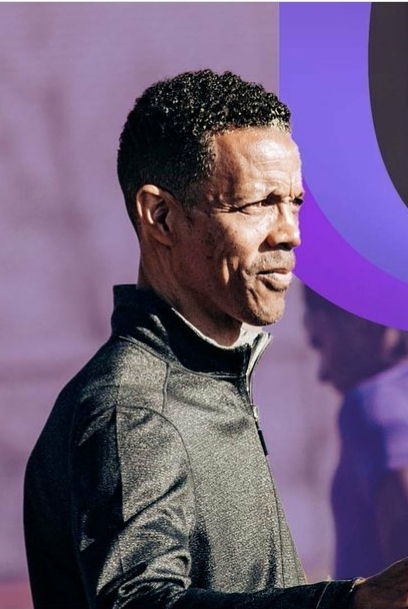
“I’m excited because it is an opportunity. We start to identify, even in this conversation you and I are having right now and the interviews you’ve had with others about this, we can identify what we are not doing, what the problems might be and we need that. But I tend to look at it from the perspective of, ‘Yeah that is a problem, but it’s also an opportunity’. So I look at NISA and think the one defining thing that it ultimately provides is that platform, that environment for young players to come through and play.”
Desmond offers a personal story to show what happens when the gaps in our soccer path exist.
“And here’s why that is so important. That player who I mentioned earlier, who moved on to the Pittsburgh Riverhounds, happens to be my middle son. I was working with Sporting Kansas City at the Youth Level as a Technical Director for all of their affiliated clubs, clubs like mine, and I identified as a scout the top players. I took 4 of my own players from my Nashville Team over to Sporting to be a part of their youth academy, my son was one of them. He signed a no-dollar contract with their 2nd team, their Championship Team, when he was 17. He thought after a year, he was going to sign a pro contract. Two of the other players did sign a pro contract and one of those actually made it all the way up and starts for them right now. His name is Phillipe Hernandez.”
“Now, my son, he did not sign a pro contract to make it to the first team. So, he had to find his way. Again, where do you go? I took him to Germany. He was there for a year. Second year, I took him to Denmark. Second half of the season COVID hits and he had to come home. So I put him with Indy Eleven Championship to train. So, here’s the problem, from the time that he was with Sporting at 17 to now that he’s with Championship Pittsburgh Riverhounds, in this country from the age of 17 to now 22, he’s too young. They don’t play him. He gets a couple minutes here and there. So at 17, he’s with a team and his coach was there for 1 year trying to win, so he only plays the older guys. The second year, he’s 18, the new coach plays to win, so he doesn’t play the young players. The third year, a new coach again, former player, great guy, but here’s the thing. In 3 years my son has had 3 different coaches, none of which will play him because this is their stepping stone as coaches to their next level and they are playing to win. Now at 22, he’s in the same scenario. Over here, he’s too young, but if I take him back to Europe, there he’s too old with no experience.”
And that is why Desmond felt the pull to do more, to create opportunities for those players with the PPL. And his vision has led him to NISA Nation.
“I tell you all that to say, that’s why I’m doing the PPL. I’m doing it so those young players can PLAY, so they can develop. And I think that formula could work in NISA. And that could separate NISA from every other league that’s in the country. You said it earlier, that there is sort of this dead space, the ‘where do these kids go?’ age. I think your term was a gap or a void, and that’s exactly it and that needs to be filled. And I see NISA as having that leverage to fill that void. That is our big vision for PPL. And hopefully we can be that proof of concept, where I won’t have to convince others.”


